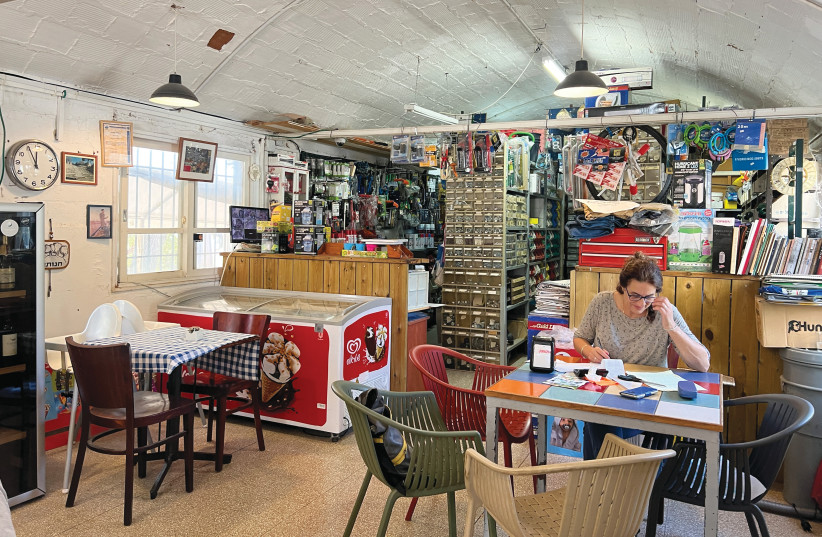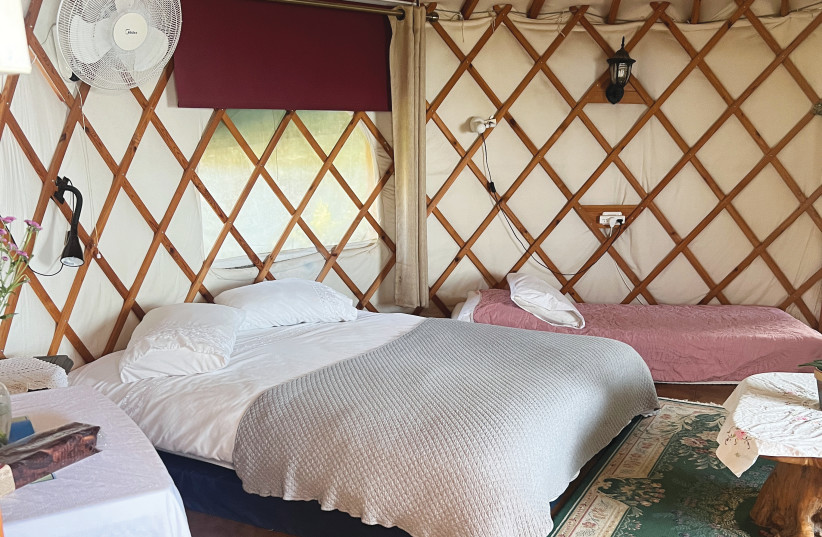In the last couple of decades, more and more kibbutzim have jumped onto the tourism train and offer hospitality accommodations. One kibbutz that recently opened a guest house is Hanita in the Western Galilee, 20 minutes inland from Nahariya.
The kibbutz, which sits up high on a hill, has a fantastic view of the surrounding forest. It might sound like Hanita is far away from the center, but the feeling of seclusion and being out in the middle of nature is one of the best aspects of staying at Hanita.
Hanita, which is one of the most veteran kibbutzim in the region, was formed in 1938 as one of the original “Tower and Stockade” settlements used by Jewish residents in Mandatory Palestine. This form of settlement was used because according to Ottoman law, no illegal building could be demolished once it already had a roof.
Like the rest of the kibbutzim in Israel, in the previous century Hanita engaged in agriculture. However, after undergoing privatization, the younger generation of Hanita leaders decided to change the business model of the kibbutz. For example, kibbutz members Nadav Kaminer and Gil Forter were interested in creating more business for the kibbutz by providing more exposure for local artists and creating other local businesses that would be a magnet for Israeli and foreign tourists alike.

1. Hanuta Café and Hardware Store
Hanuta was launched 14 years ago by Nitzan, a kibbutz member who wanted to open a café that was also a hardware store. Nitzan opened his business in a structure that used to be part a of cowshed, then later functioned as the kibbutz laundry.
In the café section, there is a variety of freshly made sandwiches, a nice breakfast spread and excellent coffee. In the evening, guests can order a tasty snack plate, with beer on tap. On Thursday nights, Hanuta has movie night with pizza for the kids; and on Fridays, it offers cheese plates and wine.
The hardware section is a place where visitors can interact with local kibbutznikim. Some people go to Hanuta just to speak with Nitzan, who loves to tell stories about the early days on the kibbutz or offer tips on great hiking and picnic spots in the area. He even created his own navigation game, which is a great way for families to get to know the different areas of the kibbutz.
Hours: Sunday-Thursday, 8 a.m.-1 p.m., 4 p.m.-6 p.m. (on Thursdays, open until 9 p.m.); Friday, 8 a.m.-3 p.m.
Details: 052-662-1177
2. Tower and Stockade Museum
Located inside the kibbutz, the Tower and Stockade Museum is a great way to learn about the history of the country’s early settlements.
Hanita is known as a Tower and Stockade success story, since it enabled the Jews to gain a stronghold in the region during the 1930s. Visitors to the museum can watch a short film on the history of the Tower and Stockade methodology and the lives of the first Jews who settled the land where the kibbutz was later built.
The museum also offers a fun activity for children in which they answer riddles, complete a colorful workbook and learn how to build a tower and stockade. In addition, the museum just completed a new escape room on site that is appropriate for the whole family.
Hours: Sunday-Thursday, 9 a.m.-2 p.m.; Friday & Shabbat, 10 a.m.-1 p.m.
3. Jullius Craft Distillery
If you are an alcohol aficionado, then you will definitely be interested in visiting Jullius, the first artisan distillery in Israel. The distillery was founded by Yuval Hargil (Joov) in 2008, and Jullius was the first distillery in Israel to make schnapps or eau de vie, from a number of grape varieties. It was also a pioneer in distilling honey, gin and a bitter digestif on a basis of local plants.
In 2017, Joov moved the distillery to Hanita and opened a visitor center a year ago, where visitors can enjoy a tasting of the various spirits.
Tasting and tours take place on Thursdays and Fridays (and on weekdays at prearranged times). The distillery, which employs three distillers, produces 30,000 bottles a year, including a number of grape varieties.
During the tour, which costs NIS 50, visitors can taste five different drinks. Cost of tour will be deducted from any purchases made.
4. Café Tzintzenet
Once you’ve had your fill of alcohol at Jullius Craft Distillery, I recommend walking down the nearby steps, which will lead you to the Tzintzenet Courtyard. Merav Ben-Ezer opened Café Tzintzenet there, and then slowly other small businesses began opening up in the courtyard as well, which was named after the café.
At Café Tzintzenet, you will always find a cornucopia of freshly baked goods made by Ben-Ezer. On Thursday evenings, Café Tzintzenet offers special foods and good music, and on Fridays, guests can enjoy homemade hummus.
Hours: Every day (except Sunday), 9 a.m.-3 p.m. (On Thursdays, open through the evening.). Best to call ahead to verify opening hours.
Details: 052-725-8820.
5. Gvul Contemporary Art Gallery
Next to the café, you’ll find Gvul (Border) Contemporary Art Gallery. Curated by Rita Katz, it displays a new exhibition every month and holds open discussions about art on the weekends. The Gvul Gallery is currently showing a solo exhibition of works by illustrator Michal Dubois called “Mama Schnitzl,” a colorful and humoristic collection.

The museum is open on weekends by appointment only.
Details: 054-637-0785
6. One of 1 Studio
Next door, you will find Liat Soto’s One of 1 Studio, where Soto sells handicrafts and jewelry made by local artists, as well as decorative home accessories.
For years, Soto, an interior designer by trade, dreamed of opening her own boutique, which she finally did in the Tzintzenet Courtyard at Hanita.
The studio is open on weekends by appointment only.
Details: 052-374-9520
7. Hanut K’tana Umatrifa
Hanut K’tana Umatrifa (Crazy Boutique Clothing), which is run by Liron Ziv, offers an eclectic assortment of items that Ziv has gathered from around the world, such as books, artwork and other fun gifts.
The boutique is open on weekends by appointment only.
Details: 052-831-3202
8. Ezer and Bilhah’s yurt
As opposed to most kibbutzim, which offer hospitality in the traditional form of a large guest house, at Hanita visitors can book accommodation from individual bed-and-breakfast owners.

Guests can choose from a wide variety of options, including a yurt that was built by Ezer and Bilhah, veteran kibbutz members. It includes a bedroom, a bathroom, a beautiful yard and balcony, and a coal fireplace on which you can roast marshmallows.
Ezer also leads tours along Israel’s border with Lebanon, during which he teaches participants about the history of the region.
Price: NIS 300 weekday for first night (NIS 150 for each additional night). Each additional person is NIS 50.
Details: 052-222-9999
9. Sabina’s villa
If you’re looking for a place to stay that is larger than a yurt, Sabina rents out a villa with a large garden for NIS 2,000 for the first night, and NIS 1,500 for each additional night. The villa can accommodate up to eight people.
Details: 052-420-8330
10. Sea Life Nahariya Hotel
Since Hanita is relatively small and not far from Nahariya, you can also stay overnight in the city, where there are many choices for accommodation.
One option is Sea Life Nahariya, which is part of the Jacob Hotels Group. The hotel recently underwent a massive NIS 15 million renovation, during which it created the Halo Spa, whose walls are made completely from salt that was mined in Eastern Europe (halo in Greek means “salt”). The hotel has 40 suites with a sea view, and another 24 with a garden view.
Location: 75 Ha’aliyah Street, Nahariya.
11. Meze restaurant
Meze offers a rich menu of Balkan-Mediterranean dishes. It is famous for its meze, or small plates of appetizers, such as skordalia (creamy potato, almonds and garlic), tzatziki (yogurt and cucumbers) and Bobove Pihtije (mashed fava beans).
The restaurant is run by chef Ofri and sommelier Adi Schwartz.
Translated by Hannah Hochner.
